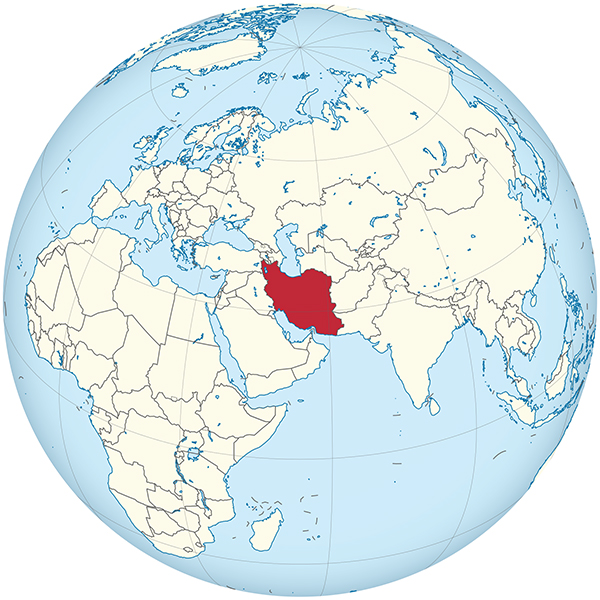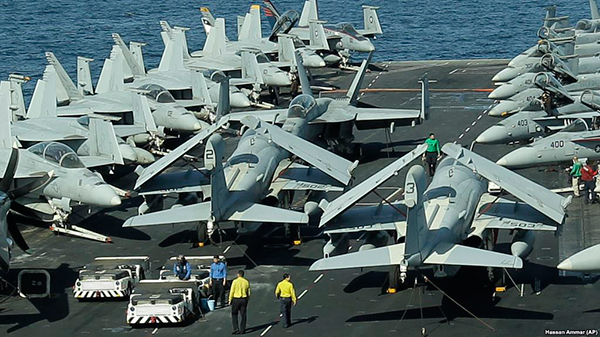Who Is Actually Threatening Who in the Iran-U.S. Conflict?
Six Basic Realities the U.S. Media Downplays, Obscures, or Lies About
| revcom.us
Tensions are heating up between the U.S. and Iran. This past week, the U.S. dispatched an aircraft carrier strike group to the Persian Gulf region because, it claimed, there was a “credible threat by Iran regime forces.” Secretary of State Mike Pompeo stated, “The regime in Tehran should understand that any attacks by them or their proxies of any identity against U.S. interests or citizens will be answered with a swift and decisive U.S. response.”
But who, in fact, is threatening who? Here are six basic realities the mainstream media downplays, obscures, or outright lies about.
- On April 8, the U.S. designated Iran’s Revolutionary Guards, which are part of its government, as a terrorist organization. This is the first time the U.S. has labeled a government institution a terrorist organization. At some point, it’s possible this designation could be used to justify further sanctions or even a U.S. military attack on Iran.
- On April 10, Secretary of State Mike Pompeo insisted to Congress that Iran was linked to Al Qaeda – “Period, full stop” -- implying Iran was involved in the 9/11 attacks. This is an outright lie, but Pompeo refused to rule out Trump’s right to wage war on Iran without Congressional approval under a law passed after Sept. 11, 2001 that gave the president unlimited authority to attack Al Qaeda.
- In late April, the Trump/Pence regime declared it was taking steps to reduce Iran’s oil exports—its economic lifeline—to zero. A year ago, the U.S. imposed draconian sanctions after it pulled out of the Iran nuclear deal, despite the fact that Iran was abiding by the agreement.1 These sanctions banned all countries from buying Iranian oil or conducting financial transactions with Iran. They have already cut Iran’s oil exports in half, shrunk its economy six percent, and greatly increased the Iranian peoples’ suffering as prices for basic necessities have skyrocketed and supplies of needed, imported medicines have shrunk. Then on May 2, the U.S. tightened the noose further by ending waivers it had granted some countries who buy Iranian oil and threatening them with punishing sanctions if they don’t totally stop trading with Iran.
- On May 7 and 9, U.S. officials announced further military escalations: four nuclear-capable B-52 bombers and a Patriot antimissile battery would also be deployed against Iran.
- On May 8, Iran announced it would stop complying with parts of the 2015 nuclear deal and resume a higher level of uranium enrichment in 60 days, if other parties to the nuclear deal (Russia, China, Germany, Britain, and France) did not follow through on promises to do business with Iran and compensate it for the damage caused by U.S. sanctions. These steps are explicitly allowed under the 2015 agreement if it is broken by one of the parties—in this case, the U.S. Yet the U.S. media rarely, if ever, reports this key fact. And despite the legality of this Iranian step, the U.S. retaliated by imposing new sanctions against Iran’s metal industries, which comprise 10 percent of its exports.
- Initially, U.S. officials made no specific allegations as to what the “credible threat by Iran regime forces” was. It was only after this vagueness was questioned that U.S. officials put forward the claim that Iran may be planning to attack U.S. forces in Iraq, and that it was putting missiles on some of its vessels. However, to date, the U.S. has produced no evidence that Iran is planning any attacks or has altered its military posture. Reports have also emerged that the U.S. claims may be based on speculation by an Israeli analyst about what Iran might do in response to a U.S. attack. This is another part of the story that the media has pretty much buried.
Meanwhile, there’s abundant evidence—in plain sight—that it’s the U.S. that IS directly threatening and economically assaulting Iran.
So what’s going on? The U.S. is the world’s most powerful and dangerous imperialist superpower, armed to the teeth with thousands of nukes. (Iran has none.) Dominating the Middle East, including Iran and the Persian Gulf, has been a key pillar of the American empire’s global status. Today, the U.S. sees Iran, a much less powerful Third World country, as a serious obstacle to its regional control and agenda. So the U.S. rulers have embarked on a strategy aiming for “regime change”—the same policy they carried out from 1990-2003 toward Saddam Hussein in Iraq.
These latest U.S. moves in the Persian Gulf are an escalation of that strategy and an acceleration of the trajectory toward confrontation. That direction and its velocity should be setting off alarms.
STOP Wars of Empire, Armies of Occupation, and Crimes Against Humanity!
1. Under this agreement, signed in 2015 between Iran, the U.S., and other world powers, Iran would drastically reduce its nuclear enrichment in return for relief from U.S. and international economic sanctions. Iran was abiding by the agreement, yet the U.S. withdrew nonetheless. [back]

The U.S. sees Iran (in red), a much less powerful Third World country, as a serious obstacle to its control of the Middle East and Persian Gulf.

Abraham Lincoln carrier in the Suez Canal, part of the U.S. escalating military presence in the Middle East. Photo: AP

Get a free email subscription to revcom.us:

